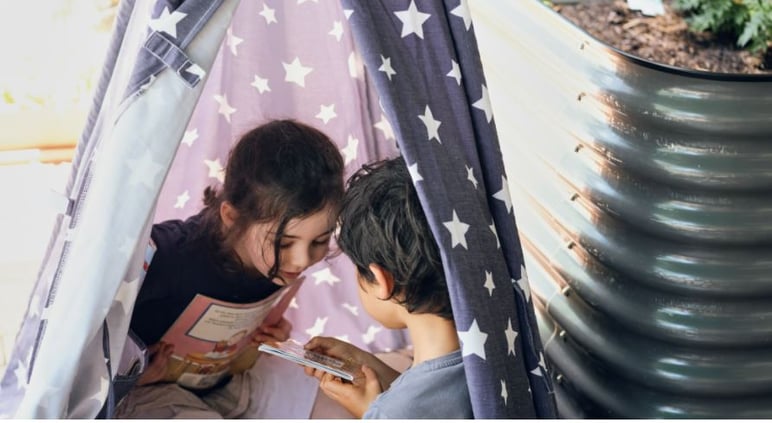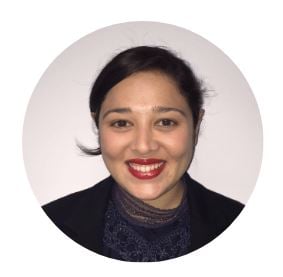Jessica from Gowrie NSW Education Hub asked Zinnia some questions about an exciting new course that provides space for early childhood educators and teachers to explore representations of diversity in picture books.
Can you share a little about who you are, where you are from and what your role is at University of Strathclyde?
Sure, and thank you for having me, Jessica! I would say I’m a proud ‘early childhood person’ through and through – all of my passion, motivation, interest, and focus is in the early years, and I’m particularly interested in anti-bias approaches, and social inclusion. My role at the University of Strathclyde is as a Lecturer of Early Years Education, and in terms of where I’m from – I guess there’s two parts to that: I’m from Australia and from India (that is, if anyone here in Scotland asks where I’m from, I say I’m from Australia, but my family and I are originally from India).
You share that you are interested in understanding how initiatives and practices in the early years can foster participation, inclusion and equity for children, families/caregivers and communities – in this course what are some of the practices that you will discuss with participants?
I think that this might depend on what comes out from one session to the next – as the aim of this series is to be responsive to what early years professionals themselves highlight as questions and provocations, based on what is going for them at this moment in their practice. I suspect that in terms of practices – it will be related to critical literacy, equity pedagogies and inclusive pedagogies because we will be talking about picture books as an entry point for engaging children with thinking about the ways in which we are all diverse individuals, as well as what Dr Kathy Cologon calls, our ‘shared humanity’.

If you could describe one of the most important ideas behind this series – what would it be?
I think, for me, it’s the idea that talking about difference and diversity can be joyful and fun (because who doesn’t love picture books?!) Difference and diversity is a wonderful thing, and we’re in a time where there are some rich stories portraying human diversity – which is exciting! But, sometimes we’re afraid or worried about talking to children about it (and there are, of course, reasons for these feelings too!) so I guess some of the key ideas we’re thinking through are ‘why picture books’, and also ‘why me’ and what is the role of the adult? In early childhood, we often talk about ‘starting where children are at’, and I think it’s important we mirror that, and start where we are at in terms of our thinking, the questions we have and where our headspace is as adults in thinking through concepts like inclusion and equity.
The design of this course is a little different to a one-time webinar. In this course, participants will participate in a mentoring session before and after the two webinars. Can you explain why its so important to revisit and explore ideas in this way versus just coming to a once only presentation?
I think there are a lot of pedagogical and philosophical reasons for this. Mostly, I think it’s trying to stay true to early childhood philosophy and pedagogy even in the context of adult education – so for example, some of the aims of this session are to be responsive to what is happening for people, and where they are at in their own practice, so that we can engage in shared reflection by drawing insights from the research and literature into that dialogue. This is also partly why, a key part of the session is networking with other early years professionals, so that we also having a space to discuss, to listen to one another, and think, so that through the sessions, our knowledge is being co-constructed, not just ‘transferred’.
In the course outline, there will be lots of opportunities to unpack different representations in picture books – can you provide a brief insight into what this idea of representation means?
Simply put, it’s about how people are being portrayed through words and images – how are their identities and experiences portrayed. So, it’s kind of that idea of – if someone made a story about you, how would you want to come across (in terms of how you look, feel, think, the things you do, how you relate to others and so on).
The idea of the ‘counter-story’ is something that will form part of the learning in this course – in a small nutshell what is a ‘counter-story’ and why is it important when reflecting on diversity?
Every story is told from a particular perspective or set of perspectives. A counter-story is a story that is told that challenges our way of thinking or understanding, by offering a different or unexpected perspective. It’s often used in critical educational theories to highlight the perspectives and insights of those who experience marginalisation (and so often are not ‘truly heard’), and so counter-stories often reveal something that we didn’t see, think about or realise before. So, for example, the three little pigs are often told from the Pigs’ perspectives, but a counter-story might tell it from the wolf’s perspective (e.g., a humorous re-telling may be where we empathise with the wolf who has a cold and is hungry, huffing and puffing, accidentally destroying pigs’ houses).
What are you most looking forward to as the facilitator of this course?
Every time I listen and engage with other early years professionals I feel at home, and I learn something new and wonderful. I think that’s what I’m looking forward to – connecting, and learning.
After attending this course, what are some of the benefits that educators and teachers may take into their teaching and learning practices with children and families?
Primarily, I hope that the course helps us to think, and be more aware of how we choose picture books, and how we use them as pedagogical tools – intentionally, to discuss difference and diversity with children. We know from the research that there are benefits when we engage children critically through picture books, and this includes things like children having a greater sense of pride in their own identities, knowing and using accurate language when talking about difference, building a sense of belonging (for children and families) in joyful, gentle, compassionate ways that resonate with ‘where we are at’ (and where children and families are at in our settings).
About Dr Zinnia Mevawalla
Zinnia Mevawalla is a Lecturer in Early Years Education at the School of Education at the University of Strathclyde in Glasgow Scotland. Zinnia has previously worked across institutions in Australia (University of Canberra, Macquarie University and Sydney University) and the
 United Kingdom (University of East London).
United Kingdom (University of East London).
Zinnia is interested in understanding how initiatives and practices in the early years can foster participation, inclusion and equity for children, families/caregivers and communities. There are five central themes to her work: Social Inclusion in Early Childhood, Inclusive Education in Early Childhood, Social Justice in the Early Years, Resistance and Dignity Work in the Early Years and Critical Qualitative Research Approaches.
We look forward to seeing you at this special event!




